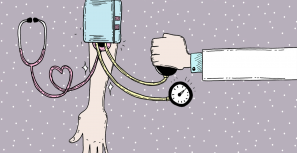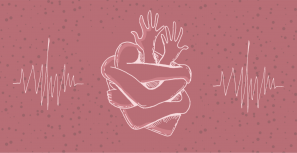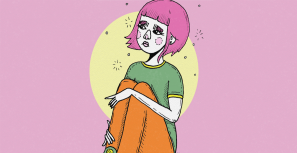许多焦虑症的症状令人痛苦但无害。虽然长期压力会随着时间的推移会损害你的健康,但大多数焦虑症状都不会导致持久的损害,否则并未指示任何健康问题。
许多关于焦虑的一个问题是它与高血压(高血压)的联系。与其他焦虑症状不同,高血压可能是危险的,特别是在患有心脏病风险的症状。在本文中,我们将检查焦虑和高血压之间的联系,并看看生活风险的影响。
Regardless of the Cause, Anxiety Needs to Be Controlled
Before getting into the relationship between anxiety and high blood pressure, the reality is that your anxiety needs to be controlled in order to avoid further raising your blood pressure. If you have high blood pressure - caused by anxiety or not - you're putting your body through considerable stress every day. Reducing anxiety is one of the first steps towards reducing the stress on your body.
Anxiety Causes High Blood Pressure
血压不是恒定的。它全天都改变了一整天,根据你正在做的事情,你吃的是什么,你的感受,依此类推。在任何时候,你都可以经历一些血压波动,导致高读数,并且读书一无所有于您的整体健康或健康。
What is high blood pressure?
Although there are some outside factors that play a role, generally doctors look at blood pressure using the following chart:
- Low Blood Pressure: <90/60
- 正常血压:90/60至140/90
- High Blood Pressure: 140/90 and Up
The first number refers to the systolic pressure. That is the pressure on your arteries when your heart contracts (pumps). The diastolic is the pressure on your arteries when your heart is at rest. Systolic tends to jump up and down throughout the day, while diastolic should stay close to constant (although it can still fluctuate).
Although there are risks involved with low blood pressure, most doctors pay especially close attention to high blood pressure. High blood pressure readings indicate that something could be wrong with your cardiovascular system. Because of the risks associated with high blood pressure, it is important to see a doctor. But if other factors have been ruled out, it is possible that anxiety may be to blame.
通过增加心率和收缩血管,焦虑导致高血压。然而,焦虑不会对一个人的身体造成任何永久性的变化,这导致高血压。相反,它只是在焦虑消散直到焦虑才能持续的血压中的尖峰。
高焦虑的人可能会因焦虑而经历高血压,但随时他们能够减少他们的焦虑程度,他们的血压应该恢复正常的基线。
焦虑导致血压低
What you may not know is that some forms of anxiety can cause low blood pressure as well. During periods of anxiety attacks, a person may start to hyperventilate. Hyperventilation occurs when the body gets too much oxygen through either fast breathing or taking breaths that are too deep.
Hyperventilation is known to cause drops in blood pressure that can lead to feelings of lightheadedness and dizziness. So while high blood pressure is more common during anxiety, low blood pressure may occur as well.
高血压可能导致焦虑
是否直接导致焦虑的高血压是不太清楚的。更常见的是,焦虑导致高血压首先,这使得该人担心他们的血压并最终经历更多的焦虑。
It's possible that high (or low) blood pressure does cause anxiety, but most likely the anxiety is a response to the high blood pressure experience, or to concerns over a person's health. Most people can't feel their blood pressure because high blood pressure on its own doesn't cause any symptoms. But some of the other causes of high blood pressure may cause a person to feel more anxiety.
Temporary Spikes Are Not Dangerous
Those with chronic anxiety may be more prone to high blood pressure spikes, but the body does do a good job of adjusting and blood pressure often gets back to its normal rate for most of the day. You can't necessarily feel high blood pressure, and while any stress on the body can cause anxiety, it's more likely that your anxiety causes the spikes than the other way around.
It's never a bad idea to speak with a doctor about your blood pressure concerns either. Only a doctor can tell you if there is something you should worry about. Also, remember that the more you worry about your blood pressure, the more anxiety you'll experience, and the more likely you'll suffer from these blood pressure spikes.
不要过于担心 - 但得到帮助
高血压尖峰可以是心脏病的担忧,但在那些没有的人中通常是无害的。尽管如此,你永远不想处理太多的高血压。高血压可以对你的心脏压力并可能损害你的血管。这就是为什么,即使在经历这些血压尖峰并不一定有任何危险,你仍然应该减少焦虑的优先事项。









